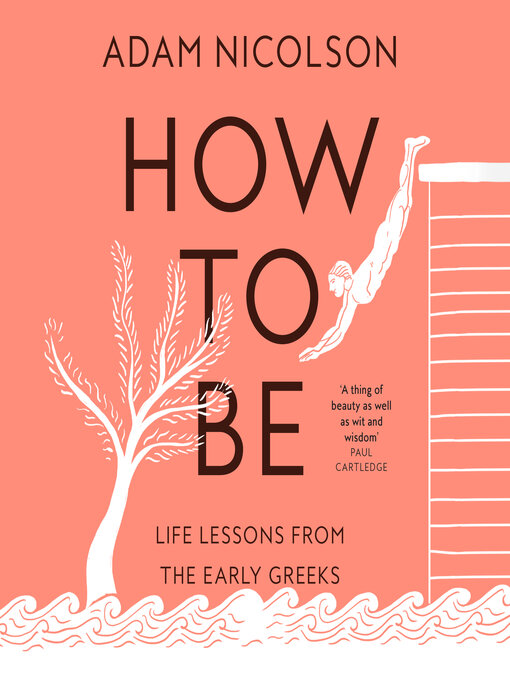- Featured Magazines
- Let's Get Cooking!
- News, Politics, and Business
- Lifestyle Magazines
- Popular Magazines
- All Magazines
- See all magazines collections
-
Creators
-
Publisher
-
Release date
October 17, 2023 -
Formats
-
OverDrive Listen audiobook
- ISBN: 9781666649017
- File size: 259103 KB
- Duration: 08:59:47
-
-
Languages
- English
-
Reviews
-
Publisher's Weekly
Starred review from July 3, 2023
Historian Nicolson (The Life Between the Tides) illuminates in this meditative account the vital influence geography had on the evolution of Greek philosophy from the 11th to the 5th centuries BCE, arguing that places gave rise to frames of mind that served as wellsprings of new ideas. Drawing on archaeology, literary accounts, and his own travels, Nicolson contends that Greek philosophers’ focus on fluidity, exchange, and connectedness derived from the growth of Iron Age port cities across the Aegean. In support of this idea, he recounts a well-worn parable of the philosopher Thales, who lived in the port city of Miletus in the 6th century BCE; Thales tripped into a well while examining the stars and was laughed at by an enslaved girl who chided him for not being able to see what was directly in front of him. According to Nicolson, this story illustrates how the tensions of the slave trade, the basis of Miletus’s coastal prosperity, led to the origins of philosophy’s self-conscious divide between the study of an ideal cosmos and an unideal reality. Elsewhere, Nicolson posits that the poet Sappho was inspired by the long absences of a maritime world to develop the idea of a distinct, isolated self that longs for connection. (“And her light/ stretches equally/ over salt sea...// But she goes back and forth remembering.”) Lyrical and insightful, this graceful analysis is an alluring must-read. -
AudioFile Magazine
Scintillating poetry from Sappho and examinations of Pythagoras's and Homer's lives and ideas are just some of the material that makes up this fascinating audiobook. Narrator Leighton Pugh introduces the literature, art, and thinking of these and other early Greeks. He connects their lives and theories with those of some of our Western thinkers whose own philosophies are rooted in these very same theories. Pugh's clear, articulate English-accented voice ties together the author's explanations of several Greek hypotheses and makes them clear and understandable, even to the unfamiliar. Pugh captures the drama of the principals' lives and the power of their words and ideas. Listeners who want an enjoyable journey through early Greek philosophy and literature will find this performance inspiring and accessible. E.E.S. © AudioFile 2024, Portland, Maine
-
Formats
- OverDrive Listen audiobook
subjects
Languages
- English
Loading
Why is availability limited?
×Availability can change throughout the month based on the library's budget. You can still place a hold on the title, and your hold will be automatically filled as soon as the title is available again.
The Kindle Book format for this title is not supported on:
×Read-along ebook
×The OverDrive Read format of this ebook has professional narration that plays while you read in your browser. Learn more here.


